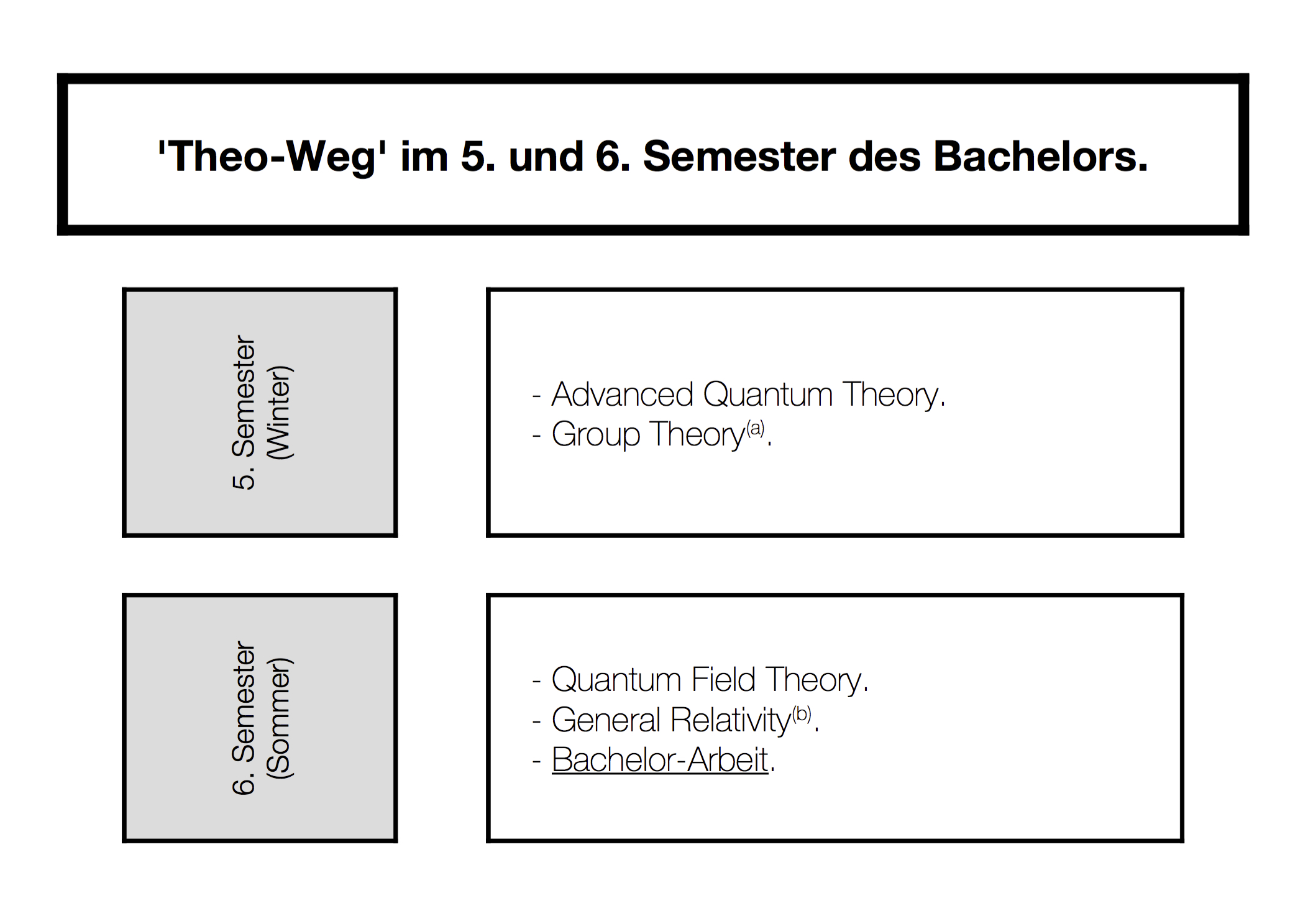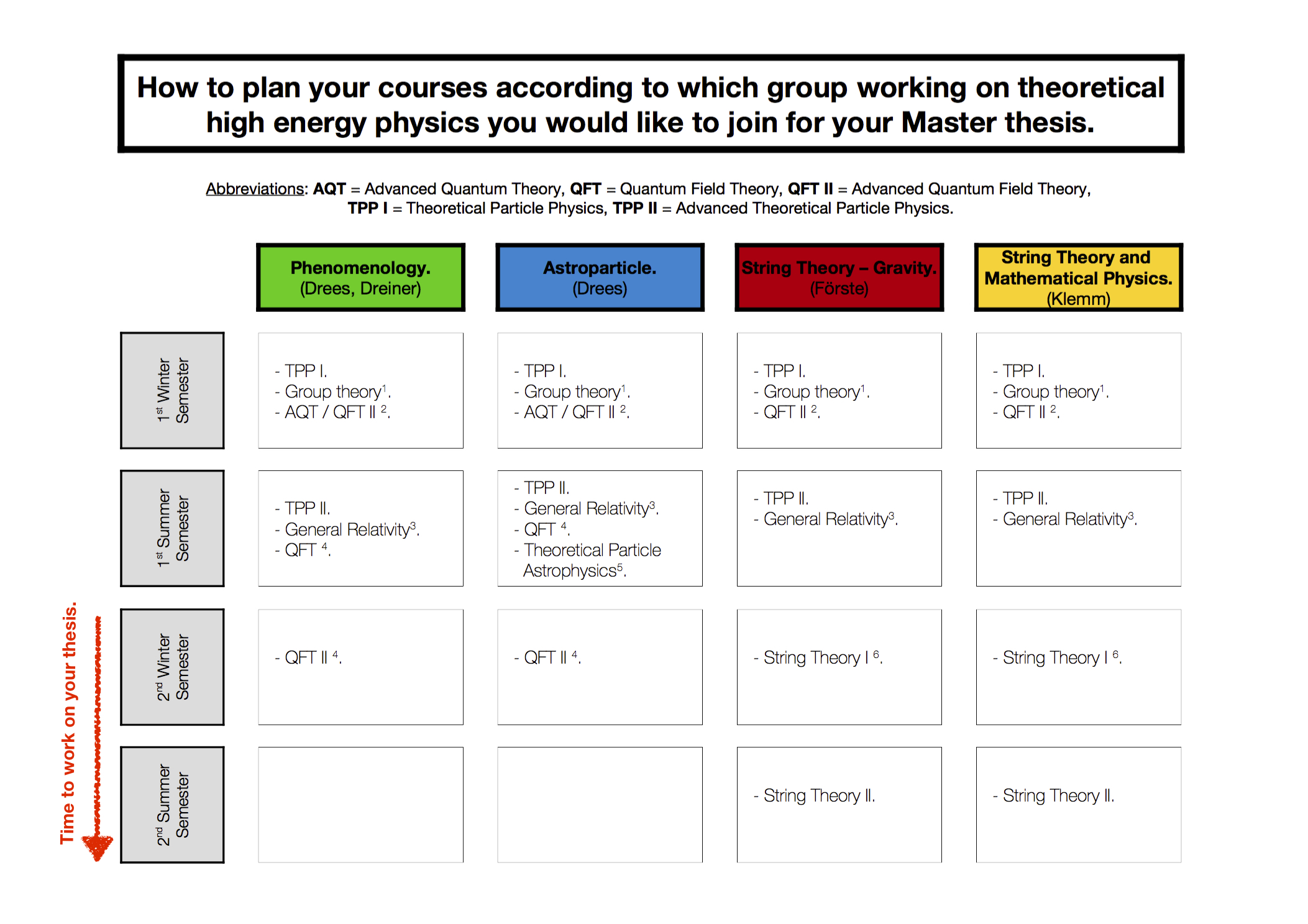The Road to a Master Thesis in Theoretical Particle Physics
A thesis in Theoretical Physics requires a lot of background knowledge from
different lectures. As you know, lectures are taught either in the summer or in the winter term, and
some of them are required in order to understand courses in the following semester. Therefore, it can be tricky to choose the right lectures at the right time in order to be well prepared by the beginning of your Master thesis.
This guide will show you how to choose the 'ideal path' of lectures, which starts already in the 5th semester of your
Bachelor studies. So, even if you are still in your Bachelor studies and your focus is mostly on theory, keep reading! (Part 1)
However, students that come from other universities to start their Master here in Bonn may have
different backgrounds. This page is meant to help these students too (Part 2).
List of lectures in theoretical physics
Be aware that it can change over the semesters. Make sure you cross-check it with the official list provided by the faculty. The list of lectures for the ongoing semester can be found here (German) and here (English).Basic lecture (Bachelor)
Elective Advanced Lectures (Master)
On top of that, there are the three theoretical Specialisation lectures: Particle Physics, Hadron Physics and Condensed Matter Physics.
Part 1: For Bachelors (German)
Wenn du deinen Physik-Bachelor in Bonn machst und deinen Master ebenfalls in Bonn und direkt im Anschluss machen willst, dann kannst du den optimalen "Theo-Weg" beschreiten, um alle Vorkenntnisse (für die th. Teilchenphysik!) zu erwerben. Dieser Weg beginnt bereits im 5. Semester des Bachelors.
Hinweis:
- höre Gruppentheorie entweder im Bachelor, oder ansonsten im nächsten Winter. Manchmal wird es auch im Sommer angeboten. Gruppentheorie ist auf jeden Fall empfehlenswert für Teilchenphysik und benötigt keine Vorkenntnisse!
- General Relativity ist nicht zwingend notwendig für Collider-Teilchenphysik. In der Astroteilchenphysik werden einige Ergebnisse der Allgemeinen Relativitätstheorie angewendet, jedoch ist deren kompletter Hintergrund nicht notwendig. Für Stringtheorie und Supergravitation ist die Vorlesung jedoch ein Muss. Da sie nur im Sommer gelehrt wird, kannst du es im Bachelor oder auch im Master hören.
Über das Wahlpflichtmodul 450 und vorgezogene Mastermodule: Im Bachelor-Studiengang musst du für das Wahlpflichtmodul physik450 eine Vorlesung aus dem Master hören (eine beliebte Wahl dafür ist Advanced Quantum Theory) oder ein Betriebspraktikum machen. Der Modulplan (hier zu finden: bachelor-in-physik) sieht dafür das 5. oder 6. Semester vor. Wenn du dich für eine Vorlesung entschieden hast, musst du diese Klausur explizit als Modul 450 anmelden. Du darfst dann dieses Fach nicht erneut im Master hören.
Desweiteren ist es möglich, Mastermodule bereits im Bachelor zu hören und die Noten später in den Masterstudiengang mitzunehmen. Wenn du die Note in der Regelstudienzeit (bis zum 6. Semester) erhältst, darfst du beantragen, dass diese Note NICHT automatisch in den Master übernommen wird. Wenn du eine Note im 7. oder späteren Fachsemester erhältst, wird sie auf jeden Fall übernommen. Die Voraussetzung für vorgezogene Mastermodule ist, dass man bereits das Wahlpflichtmodul 450 absolviert hat.
Nun kann es vorkommen, dass du gleichzeitig eine Vorlesung für 450 hörst, als auch eine vorgezogene Mastervorlesung. In diesem Fall sprich mit dem Fachstudienberater Herrn Priv.-Doz. Dr. Metsch und teile deinen "parallelen Wunsch" mit. Du musst dann dein Wahlpflichtmodul selbst über Basis anmelden, und die zweite Anmeldung muss vom Prüfungsamt vorgenommen werden.
In diesem Zusammenhang verweisen wir auch auf eine Reihe von sehr nützlichen Mitteilungen des Prüfungsamtes.
Part 2: For Master students
First of all, the Master program in Bonn offers three branches of theoretical specialization lectures, of which you should choose (at least) one.- Theoretical Hadron Physics
- Theoretical Condensed Matter Physics
- Theoretical Particle Physics
This guide is written for theoretical particle physics, so it is assumed that you have chosen this specialization. Therefore students willing to join any of the groups mentioned below are required to take both Theoretical Particles Physics 1 and 2 (the latter is also called Advanced Theoretical Particles Physics). The courses should be attended in the first winter and first summer semester, respectively, as shown in the table under the shortenings TPP I and II. At the moment, we do not include the working groups for hadron and condensed matter physics (but will hopefully do so in the future).
If you are about to start your Master in Bonn and you are interested in theoretical particle physics, then you'll encounter one major difficulty: most of the specialisation lectures in your first semester require at least a basic knowledge of Quantum Field Theory (QFT). However, since you will most likely start your Master in the winter semester, you are forced to start with the Advanced Quantum Field Theory (QFT II) course, at the point where most of the students haven't yet taken a course which covers the basics of Quantum Field Theory. If you did your Bachelor in Bonn and already did Quantum Field Theory, you can of course jump right into Advanced Quantum Field Theory in the first Winter semester.
Here is a non-exhaustive list of buzzwords that you'll need to know about in order to follow the specialisation lectures:
- Feynman diagrams (what they are, how to calculate them)
- Lagrangian function and Action principle (How to write down a Lagrangian, what the different parts are, how to extract Feynman rules from it.)
- Dirac spinor formalism
- Gamma matrices
- Cross sections
- Noether theorem
- Symmetry groups
Don't panic if you are not familiar with such concepts! Luckily, there is a CRASH COURSE organised exactly for the purpose of filling those gaps before the first lecture starts (this took place for the first time in the winter term of 2015/16).
Here is a suggestion of lectures to attend when you start fresh your Master in Physics at Uni Bonn:

Notes:
- Group Theory does not have any prerequisites. It provides very useful insight into what theorists are talking about, and it is thus highly recommended.
- Advanced Quantum Theory (AQT) is recommended if you have only a basic knowledge of non-relativistic Quantum Mechanics and no knowledge of Quantum Field Theory (QFT). On the other hand, if you have a good knowledge of QFT when you start your Master (for example, if you did your Bachelor in Bonn and already had QFT there) you should start with QFT II in the first winter semester. A word of caution: This lecture might be hard and you should consider not counting this grade to your final grade. In case you are interested in string theory/gravity and geometrical aspects of spacetime as a thesis topic, we assume that you pick this lecture here in order to follow the string lectures.
- Optional for collider physics. Some results of General Relativity are required for Theoretical Astroparticle Physics, but a complete understanding of the former is not required for practical work in this area; the class can then e.g. be taken in the 4th semester of the Master studies. Good knowledge of General Relativity is required for work on supergravity and superstring theory.
- If you belong to the first group of people described in footnote 2, then you should have Quantum Field Theory in your 1st summer semester and Advanced Quantum Field Theory (QFT II) in your 2nd winter semester. If you belong to the second group, i.e. you already had the Advanced Quantum Field Theory at this point, you can skip this recommendation.
- This one is more at the level of the specialisation lectures, meaning that you need Theoretical Particle Physics I to be able to understand it.
- In order to be ready to work on your Master Thesis on String Theory by the beginning of the second winter semester, you might have to study some related topics a bit in advance, even before you attend String Theory I.